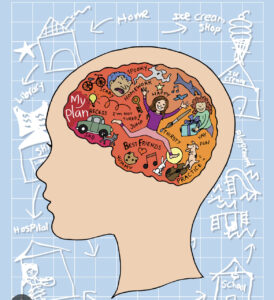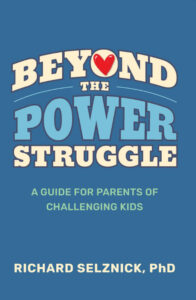Blog
Dr. Selznick’s blogs are written to help parents navigate the difficult waters of raising children struggling with learning disabilities such as dyslexia, as well as ADHD and deficits of executive functioning. His overriding mission is to speak to parents in “down-to-earth terms free of jargon.”
“Reading Comprehension Challenges & School Bus Problems: What’s the Connection?”
 When Kids struggle with reading comprehension it is interesting that there often is an overlap in “real life,” that is in the way the child interacts in their personal world.
When Kids struggle with reading comprehension it is interesting that there often is an overlap in “real life,” that is in the way the child interacts in their personal world.
In this era of automatically labeling and pathologizing behavior as “ADHD,” this overlap is something rarely considered, but I think it is worth reflecting on its implications.
Here’s an example.
12 year old Logan is a boy who recently got into a lot of trouble when he used inappropriate language (along with other inappropriate behavior) on the bus. When the bus driver tried to correct him, Logan doubled down and got mouthy and defensive.
In other words, Logan showed a lot of bad judgment.
Compounding this, when Logan’s parents attempted to discipline him, rather than become low-key and contrite, he became belligerent, while melting down.
(I know, everyone’s pulling out their, “ADHD checklists” and quickly putting him on medication, but I’m not so sure. We need to dig a little deeper.)
Upon meeting Logan, he comes across pretty straight-forwardly and readily admits he has a problem managing anger. Particularly noteworthy, Logan felt bad about what happened and he regretted his behavior.
So, what’s the connection with reading comprehension?
Simply, Logan didn’t make connections while reading. For example, Logan couldn’t make inferences or answer “why” questions, as in “Why did a character behave in a certain way?” Logan tended to respond quickly without giving the question much consideration, which is not a good strategy for inference type questions or ones involving drawing conclusions.
What does Logan need? While many practitioners would quickly go to medication, Logan needs direct instruction in the skill of making inferences , in other words help with reading the clues. Also, in is personal world Logan needs help with learning to read the signals and the consequences of his actions.
Neither of these will be easy and it will take time to chisel away on developing the skills (socially and academically), but with guidance, feedback and practice the skill of comprehension and the skill of social interaction can be developed.
When given feedback directly to Logan and his parents following an assessment, Logan felt good about what was said to him and his personal “battery” was recharged, since he was told he was smart and that he could improve. Logan was determined to start “reading the clues” better.
Takeaway Point
There may be a connection as to how a kid behaves on the school bus, manages emotions and comprehends while reading.
Look for common themes.
To receive future blog posts, register your email: https://shutdownlearner.com.
To Contact Dr. Richard Selznick for advice, consultation or other information, email: shutdownlearner1@gmail.com.

 Copyright, Richard Selznick, Ph.D. 2023, www.shutdownlearner.com.
Copyright, Richard Selznick, Ph.D. 2023, www.shutdownlearner.com.
“Rubbing My Head” (#Dyslexia #ADHD #Whatever)
This blog can occasionally serve as a bit of a confessional, providing me with a forum to voice some concerns regarding the issues that emerge while working with struggling children and their parents. So, with that in mind here’s a confession. Sometimes I honestly...
“Takes Your Breath Away #Dyslexia”
Even though I’ve probably evaluated a few thousand dyslexic kids in my career, it still takes my breath away when I meet those who are on the more significant to severe end of the spectrum. This week my breath was taken away on back-to-back assessments. Both children...
“We’re Not Doctors…We Think You Should See a Neurologist”
Oliver, age 8, has difficulty behaving in his third grade class. They were told by the school, "We're not doctors, so we don't know why he's doing these things, but we think you should see a neurologist." The last statement is code language. Here's the translation -...
“Missed Opportunities for Practicing ‘The Skill of…'”
So much of a child’s world can be framed in an ongoing series of different skills. For example, some kids have the “skill of” saying hello and greeting someone they meet for the first time. Others may have the “skill of” manners in social interactions by saying...
“‘Hayden, Remember to Use Your Indoor Voice'”
Modern parents can make you nostalgic for bygone eras. There was a time when children went outside to play and basically did not see their mother for a solid 8 hours, except when she made them a nutritious bologna sandwich on white bread, which was wolfed down before...
“‘Spilling the Milk’ & ‘You Owe Me’ – Child Behavior in Two Acts”
Since my latest book, Beyond the Power Struggle: A Guide to Challenging Kids, was published some months ago, I have had some interesting interactions – a number of different interviews and parents contacting me about their kid’s behavior. A nice surprise was a small...
“So, What If I Have Dyslexia?” (#Dyslexia)
“So, what if I have dyslexia?” The question threw me a bit, especially since it was coming from a nine-year-old boy.” 99% of the time when I ask a child, even a teenager, whether they have any questions following an introductory session, they shake their head saying...
“Dyslexia is Not a Score”
A number of years ago, I had the good fortune to take part on a panel during a symposium on dyslexia sponsored by the grassroots parenting group, Decoding Dyslexia: NJ. Dr. Sally Shaywitz, the author of “Overcoming Dyslexia” was the keynote speaker. While talking...
“Gradations from the Middle” (#Dyslexia #ADHD #Other Stuff)
Parents commonly come in with common questions such as, “Does their child have ADHD?” or “Is my child dyslexic?” Difficulty with reading and attention occur on a continuum or a spectrum from below the mid-point of average (see bell-curve picture above), to more...
“Double Check Your Hypotheses & Theories” (#Child Behavior)
While meeting with parents to discuss the concerns they have regarding their children’s struggling, numerous hypotheses and theories are often offered as to why children do what they do. Typically, the theories are linked to medical explanations, in other words...
“The Power of Nonchalance” (#ADHD; #Executive Function Disorder)
Synonyms for “nonchalance:” apathy, complacence, indifference, unconcern, torpor Antonyms for “nonchalance:” concerned, interested, motivated A parent came to talk to me about her 14-year-old-son, Brett. Previously “diagnosed” with ADHD of the inattentive variety,...
My Interview with Documentary Film Director, Jamie Redford (#Dyslexia)
(***This blog is a revision of an earlier post.) Understanding dyslexia is challenging, primarily because of the deeply embedded mythologies that we hold. Chief among them is “the reversal thing.” To illustrate, try this experiment. With any friend or relative ask...
“Not Reading the Signals”
An issue often overlooked with children diagnosed as ADHD is a frequently occurring underlying variable of social judgment and difficulty with “reading” cause and effect. Difficulty with reading cause and effect impacts both social and academic functioning, such as...
Join the Fun: “Empowered Parents Summit”
I am honored to be a part of this Empowered Parents Summit. So many great speakers are presenting their view of parenting in the modern era. I will be talking about issues related to my latest book, "Beyond the Power Struggle: A Guide for Parents of Challenging...
Interview with Betty B. Osman, Author: “No One to Play With: The Social Side of Learning Disabilities”
A number of years ago - time does fly by - I was the host of a podcast show that was a part of The Coffee Klatch Network, Special Needs Talk Radio. In that role, I had the honor of interviewing some of the top names in the field. I thought it would be fun to revisit...
“Ongoing Themes: #Dyslexia #ADHD #LD Discrepancy #504 #Parenting”
Those of you following this blog for some time know there are some recurring themes in these posts (that mostly irritate me). For others newer to these posts, I will help to bring you up to speed with some of the predominant ones. The LD-Discrepancy Model: Easily the...
“Ineffective, Inefficient, Irrational, Immoral and Indefensible”
Most of you understand the concept of standard error of measurement (SEM). In a nutshell, SEM tells us that on any given day that you can be within an interval of confidence that an obtained score is accurate. For example, if the obtained IQ score is 100, you can have...
“Homework??? That’s So Yesterday.”
More and more, parents tell me that their children never get homework. When there is homework, it is often a battleground. Refrains such as, “It’s stupid,” “I hate it,” “It’s not fun,” and variations on these themes occur across the country starting in the...
Podcast Interview Released
As a changes of pace, I am excited to share a recent interview that was conducted with me by "Beautifully Complex: Navigating Neurodiverse Parenting." The interview is only about 30 minutes. Would love to get your feedback on it. If you enjoy it, please share it...
Remember the Child’s Primary Motivation
Understanding what children want can bring about a major shift in your thinking. If you embrace this concept, I predict your perceptions will change for the better, which then will impact your child. So, what is your child's primary motivation? At the root of most of...
“Math Disability? Not So Fast”
Not sure when the reverence for word problems emerged, but it seems that children are almost exclusively taught math through word problems. I believe it’s linked to the theory that math should always be enhancing “higher order thinking.” Let’s look at Chris, age 7, a...
“Pictures Telling the Story”
Largely supported by the medical model, when parents have their child assessed they are often focused on “the diagnosis.” Such a model embodies a, “Yes, they have it,” or “No, they don't have it,” (whatever "it" is) perspective. In my corner of the universe, I...
“And Now, For a Change of Pace”
My marketing manager (my daughter Julia) has been pushing me to create more short videos to spread around. So, as a change of pace here are two that were posted to YouTube. TRUST ME. THEY ARE VERY SHORT!!!! Hope you enjoy. Let me know what you think. The first one...
“Does Spelling Matter?”
Let’s say your 12-year-old sixth grader spells the following words: (brief) bref (should) shood (grown) gron (success) susess (educate) edcccate (result) resolt (kitchen) kicten Then the child writes the following story to a prompt: “Once a o pon a...
